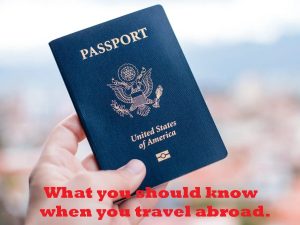 Guest Columnist: Horst Kniesel
Guest Columnist: Horst Kniesel
As part of my job working for a prominent American bank, I was required to travel frequently to many countries in Western Europe, including England, Germany, Austria, Switzerland, Italy, France, Greece, Ireland, Belgium, Spain, and the Netherlands.
My wife and I lived in London for over six years, during which time we were invited to many social gatherings and formal receptions. When I was eventually called back to the United States, I was then asked to travel extensively to the Far East and Australia, where my trips took me to Tokyo, Singapore, Hong Kong, Seoul, Bangkok, and Sydney.
Throughout my travels, I interacted frequently with residents in hotels and restaurants, in shops and on the streets, on public transportation and in taxicabs, in their homes and at their places of business. I was generally well-received by the people I met and often asked if I was an ambassador. I was introduced to many officials and dignitaries and found it very useful to be aware of the local protocols and to apply good professional etiquette. Here are some of the approaches I learned and practiced that will help you with your international travels:
- Extend your right hand when you greet someone, and look at them with a sincere smile.
- Greet them by their name and introduce yourself with yours.
- Be positive in your comments and, if possible, compliment them on something—appearance, dress, enthusiasm, weather, car, food, wine, etc.
- Do not be critical if something is not the same as it is in your own country. This can generate a negative conversation, and you can quickly alienate yourself.
- Be polite, and say Thank You and Please whenever appropriate.
- It is still common in many countries to hold a door open for someone, to get up when an elderly person is looking for a seat, to hold a serving plate for someone next to you at a dinner table, to help an elderly person cross a busy street, to help someone by lifting packages or a suitcase, on a bus or train, or to provide any such courtesy.
- Offer to provide simple assistance as needed.
- Order local foods or local specialties to show your appreciation of their local cuisine or culture.
- Sit properly at a dinner table, and do not slouch.
- Eat with a knife and fork, or chopsticks, as the locals do.
- Do not speak or drink when you have food in your mouth.
- Eat with a closed mouth.
- Try not to be demanding or loud when an error is made. Be polite and understanding.
- Accept the local customs and do not be critical of them. You are a guest in their country.
- Speak clearly and slowly so that you can be understood, and do not use slang.
- Try to speak one or two phrases in the local language to show that you respect them.
- Learn to say Good Morning, Good Afternoon, Good Day, Please, Thank You, Yes, or No with ease.
- Use simple hand gestures to express what you are asking.
- Be sure to thank the hosts before leaving a dinner party, and always remember to send a thank-you note.
- When meeting someone for a business discussion, take time to exchange pleasantries before diving into the purpose of the meeting.
- When ending a meeting, summarize your understanding and conclusions, and shake hands as you depart.
I have traveled internationally for over 45 years and have made it a practice to use the approaches and practices stated above. They are universal behaviors, and they can be applied to your advantage at home as well as abroad.

Horst M. Kniesel Former First Vice President JPMorgan Chase Bank, N.A. Chicago, Illinois



Sir, I am deeply touched by your immense experience and great insight. I am grateful to share this from you, I will like to be associated with you through our company here in Nigeria called PSG Global Services , we engage in protocol service, we will like to handle your protocol whenever you are in Nigeria.
Thanks,
Peter Obafemi,
MD /CEO
PSG GLOBAL SERVICES LTD,
LAGOS, NIGERIA